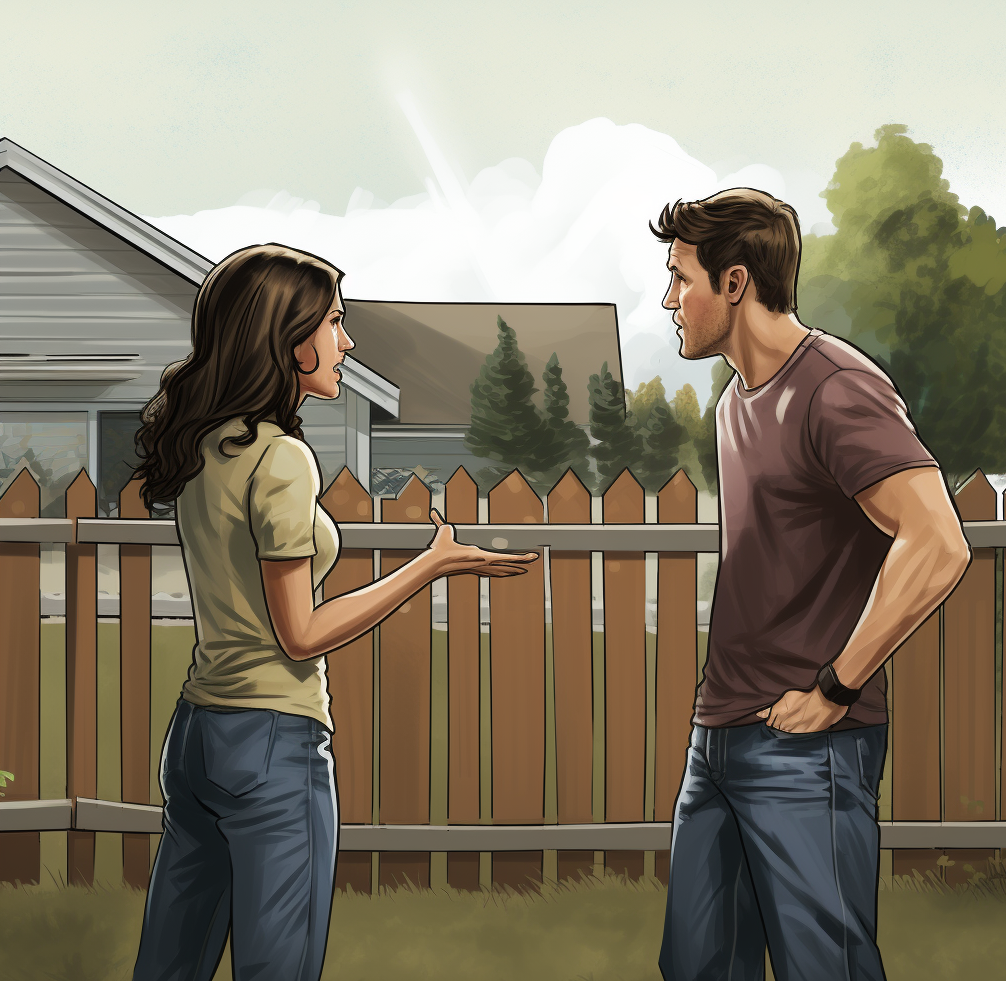Residents sometimes experience disputes with neighbours over issues such as overhanging trees, fence boundaries, or the cost of a new fence. These matters are considered civil disputes, meaning local councils generally have no authority to intervene. Wherever possible, it is best to resolve the issue through open discussion and negotiation with your neighbour before pursuing formal action.
Overhanging Trees
Overhanging trees are one of the most common neighbour disputes. The law in Victoria allows you to cut back branches, roots, or other parts of a neighbour’s tree that encroach onto your property, but only up to the boundary line. You are not permitted to trespass onto their property to do this work. The cuttings remain the property of your neighbour, so you should offer to return them.
If the tree is dangerous (e.g. structurally unsound, diseased, or causing significant damage), you may seek orders through the Magistrates’ Court or VCAT for removal or pruning. However, these processes can be costly and time-consuming, so negotiation is strongly recommended first.
For disputes specifically about trees on boundary lines or damage caused by trees, the Dispute Settlement Centre of Victoria (DSCV) provides free mediation services.
Further information: Disputes Victoria – Trees
Fences
Fences are covered by the Fences Act 1968 (Victoria). To protect your interests:
- Engage a qualified surveyor to confirm boundary lines consistent with the titles registered in the Titles Office.
- Under the Act, neighbours are generally required to contribute 50% of the cost of a standard fence.
- If your neighbour refuses to cooperate, the matter can be enforced through the Magistrates’ Court.
- If the fence is dilapidated, a neighbour can seek a contribution for 50% of a reasonable cost of replacement, which may be determined at a VCAT hearing.
Further information: Disputes Victoria – Fencing
Troublesome Neighbours
If your neighbour is engaging in anti-social or disruptive behaviour, it can be very stressful. Authorities such as police or council officers typically require clear evidence before they can act.
Steps you can take:
- Document incidents with photographs, audio, video, and written notes including dates and times.
- Install security cameras on your property – you may position them to capture activity in the street or at your boundary. Modern systems allow convenient monitoring from your phone.
- Street lighting – councils maintain recommended lighting levels. If you believe lighting is inadequate, contact council and copy in your ward councillors. In some cases, additional lighting has been installed where levels are below standard.
- Fires – open-air burning is generally prohibited. Council may act if there is a regular, predictable time when a neighbour lights fires.
- Untidiness – council can only enforce against untidy properties if the conditions are extreme (e.g. long, dry grass in summer creating a fire hazard).
Other escalation options:
- Contact your councillors with well-documented evidence.
- Ask a public question at a council meeting.
- Consider a petition if multiple residents are affected (though some neighbours may be reluctant to sign).
General Guidance
- Councils do not mediate these types of disputes on private land.
- It is almost always faster and cheaper to resolve matters directly with your neighbour.
- Where agreement is not possible, you may need to pursue mediation or tribunal/court action.
Suggested process:
Disputes with Neighbours
Neighbour disputes often arise over issues like overhanging trees, fence boundaries, or sharing the cost of a new fence. These are considered civil matters, meaning local councils do not have authority to intervene. The best first step is always to try open discussion and negotiation with your neighbour before pursuing formal action.
Overhanging Trees
In Victoria, you are legally allowed to cut back branches, roots, or other parts of a neighbour’s tree that cross into your property, but only up to the boundary line. You cannot enter your neighbour’s property or lean over the fence to cut without permission, as this is trespass. Anything you cut remains the property of your neighbour and should be returned to them, preferably in a tidy manner. If the tree is protected by local laws (e.g. heritage or native vegetation overlays), you may need council approval before cutting. For dangerous or damaging trees, you may need to seek orders through the Magistrates’ Court. Free mediation is available through the Dispute Settlement Centre of Victoria (DSCV).
Fences
Under the Fences Act 1968 (Victoria), neighbours are generally required to share the cost of a “sufficient dividing fence.” To protect your interests:
- Engage a surveyor to confirm boundary lines against the title.
- Serve a written fencing notice on your neighbour if you cannot agree on repairs or a new fence. This sets out the proposal and cost.
- If no agreement is reached within 30 days, you may proceed and later recover costs through the Magistrates’ Court.
- If your neighbour wants a higher standard of fence than usual, they pay the extra cost. If someone damages a fence, they can be made to pay the full cost of repair.
Further details: Disputes Victoria – Fencing
Troublesome Neighbours
If your neighbour engages in antisocial or disruptive behaviour, authorities generally require clear evidence before acting. Useful steps:
- Keep records – photos, video, audio, and written logs with dates and times.
- Install cameras – you may place them on your property facing the street or your boundary.
- Noise – councils can investigate ongoing noise problems (like barking dogs or machinery). Police deal with urgent or one-off noise.
- Fires – open-air burning is not permitted. Report repeat offenders to council.
- Untidiness or fire hazards – councils can act if properties are severely overgrown or dangerous.
- Street lighting – councils or power distributors maintain lights. Report inadequate lighting to council with details.
If multiple residents are affected, you may raise the issue at a public council meeting or submit a petition. Councillors can also follow up with officers if council responsibilities are involved.
General Guidance
- Councils do not mediate private disputes. Resolving issues directly with neighbours is often faster and cheaper.
- If agreement is not possible, mediation through the DSCV is free and often effective.
- As a last resort, you can seek orders in the Magistrates’ Court for fencing, dangerous trees, or personal safety intervention. Note that VCAT does not handle typical fence or tree disputes.
Support services:
Further Reading
Melbourne tree disputes: The neighbours spending tens of thousands of dollars on legal fees

